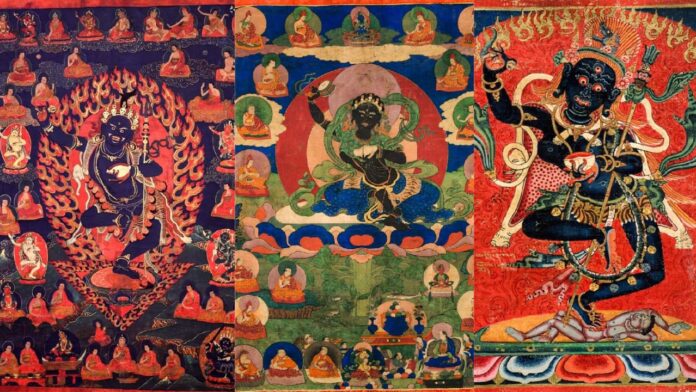In the intricate tapestry of Tantra, women are not merely spoken of with reverence—they are esteemed and honored through profound respect and acknowledgment of their spiritual significance. The tradition of Tantra, deeply rooted in the recognition of feminine divinity, celebrates women as the embodiment of Shakti, the primordial cosmic energy.
Dakinis: The Guiding Lights of Tantra
Historically, Dakinis have held esteemed positions of spiritual authority within Tantra. These female gurus, akin to spiritual guides, played pivotal roles in guiding practitioners along the Sadhanamarga path. During the Pala Yuga era, many of the revered Churashi Siddhas, or eighty-four Siddhas, were under the tutelage of renowned female gurus such as Shundini Lokadakini and Nigu Dakini. These Dakinis were highly respected, their wisdom and spiritual prowess akin to holding a prestigious Ph.D. title in modern times.
Regrettably, the honor and reverence once attributed to Dakinis have diminished over time due to the influences of Brahminical patriarchal systems. Despite this, the essence of their role as enlightened beings and guides remains integral to Tantra. True practitioners recognize the indispensable value of Dakinis, whose wisdom and guidance are crucial for navigating the spiritual journey.
Yoginis: Embodiments of Shakti
Yoginis represent the potential of women to embody Shakti herself, the essence of Kundalini energy. Encountering a Yogini in her divine form is considered a profound blessing, a rare and auspicious occurrence. These women are not only practitioners but also wise guides and gurus. The empowered women of this caliber are revered as the sixty-four Yoginis or the Dasamahavidya, embodying the highest spiritual ideals.
The true nature of a woman’s spiritual stature is not readily apparent from outward appearances. This underscores the importance of treating all women with utmost respect, as any disrespectful behavior or speech can negate the benefits of Tantra practice. Recognizing and honoring the divine feminine in all its forms is fundamental to the path of Tantra.
Dyuti: Companions of Male Saints
In the Brahmayamala Tantra, women who serve as companions to male saints are referred to as Dyuti. Disrespect towards these women is tantamount to disrespecting Tantra itself. A true practitioner of Kali worship, or any authentic Shakta tradition, would never espouse misogynistic teachings. Statements such as “women are the gates of hell” or “women are the tribhuvana” are antithetical to the core values of Tantra.
Adya Nitya Avyakta Prakriti: The Primal Eternal Nature
At the heart of Tantra lies Adya Nitya Avyakta Prakriti, the primal eternal manifest Nature. This transcendent force exists beyond speech and thought, beyond the visible realm. For the purpose of meditation, practitioners refer to her as Shaktara Maa and envision her as Vishwayoni, the cosmic womb. She is the origin and the ultimate destination of all existence. Recognizing the Divine Mother, Jaganmata, as the creator and dissolver of the world is central to the Shakta tradition.
The Divine Feminine: Infinite Power and Purity
Women, in the context of Tantra, are not objects of mere desire. They embody infinite power and are to be honored and protected. According to the Brahmayamala Tantra, women are described as the reservoir of boundless energy, never impure in any circumstance. The Goddess manifests in various forms, from the virgin to Dhumavati, from child to old woman, embodying the full spectrum of feminine power.
An illustrative tale from history recounts the fate of Emperor Pratapaditya of Jessore. In a moment of rage, he ordered the breasts of an old beggar woman—who was, in fact, the Goddess Bhagwati herself—to be severed. This act of profound disrespect led to the downfall of Emperor Pratap, despite his formidable army. This tale underscores the grave consequences of disrespecting the divine feminine energy.
Conclusion
In Tantra, the reverence and empowerment of women are not merely doctrinal—they are lived principles. Women, as embodiments of Shakti, hold the key to spiritual progress and enlightenment. Honoring the divine feminine in all its forms is essential to the practice of Tantra, for without it, the path to spiritual realization remains incomplete.





